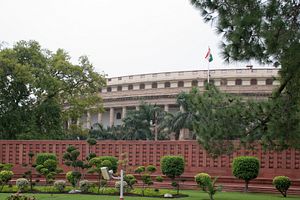This has not been a good week for Indian politics. Moreover, it has not reflected well on the political establishment, from either of India’s two main national parties, the ruling Bharatiya Janata Party (BJP) or the Congress Party.
India’s ruling BJP entered power on a strong mandate because of its development-oriented platform, a platform that was theoretically sound on both the economic and security levels. Yet unfortunately, other than markedly improving India’s diplomatic policy and inspiring bureaucrats to show up on time more often, the present Narendra Modi-led government has only achieved partial gains, especially economic ones. Most disappointing is the failure of the government to pass an important land bill that would have made its acquisition easier for industry.
The BJP can try again after securing more seats in the Rajya Sabha (upper house of the Indian Parliament, where it does not hold a majority), though it could have gained victory by convening a joint session of Parliament. The bill failed in the face of opposition from Congress Party led protests that often smacked more of hooliganistic disruption in the Lok Sabha (lower house of the Indian Parliament) than reasoned parliamentary debate. One might think that there is something to be said of a former Indian Supreme Court Justice’s wish that more Indians development a “scientific temper” to rationally address problems.
Part of the problem the current government has in implementing reforms is not only due to its own failure to push through reforms over political gain or the convoluted Indian system—which could well be designed to keep India agrarian and dysfunctional for both ideological and elite oriented reasons—but stems from the fact that it is unable to make a good case for economic liberalism to a population that is not ready for it cannot understand it. It could be that much of India’s population, or at least well-organized segments of it want to have their cake and eat it too.
Instead, the BJP has clumsily decided to focus on other cultural and social issues. This will not help it win elections in the long run, however, and could help tank the BJP’s electoral count for the 2019 election as people grow disillusioned with it. India is a fairly conservative country, and one suspects that the recent outcry over the government’s botched attempt to censor (some) pornographic content was more of an issue for liberal, urban people than the vast majority of the country which doesn’t even have steady internet access due to economic reasons. Yet the vast majority of the country, especially in rural areas, would ideally wish for the government to dedicate itself primarily to development and economic issues and not waste time on social issues. And a Congress victory in 2019 would only be worse for India. Moreover, in the traditional Hindu political tradition, the government can in fact permit numerous activities considered vices, so as to tax and regulate them, while focusing on maintain security and general welfare. Try as it may, the government cannot turn everyone into rishis and gurus.
The BJP come out looking weak from backing down due to pressure from the media and the Congress Party on numerous issues. It also showed a distinct problem with thinking out and planning its policies and considering the impact that they would have on people. This can hardly bode well for a party that was elected to fundamentally reform the country. The Congress Party, however, also comes off badly. Its actions in disrupting the BJP’s initiatives are opportunistic and rooted in no ideology or policy other than its own benefit. Furthermore, the dynastic leader-in-waiting of the party, Rahul Gandhi and his mother, Sonia Gandhi both come across as arrogant and entitled, preventing other voices in Congress from shining or steering the party in a more rational direction. Shashi Tharoor (though flawed in many ways) is a very active, outspoken, and intelligent member of the Congress Party who could probably do a far better job than Rahul Gandhi, or at least inject new life into what has become a sycophantic dynastic outfit far removed from its original form. However, people like him are not allowed by the party to emerge because they are seen as threats to the Nehru-Gandhi Dynasty. All the while, the party continues to do poorly in India’s states, losing ground to the BJP and regional outfits.
India is coming along well enough and all is not gloom and doom. Yet one must question whether or not India’s political and party system is fundamentally flawed and if perhaps it is time for a new legal regime and more streamlined, less convoluted governmental structure, and perhaps an improved Constitution even. This is not a radical proposal as numerous countries have made fundamental reforms at the most basic level when necessary, the United States included. However, good luck getting this done in India.

































